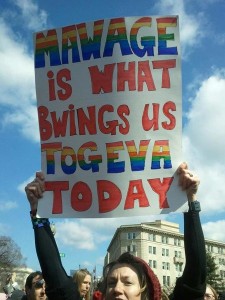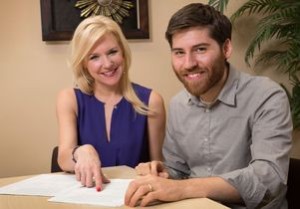 Mating strategy & beliefs about homosexual promiscuity key
Mating strategy & beliefs about homosexual promiscuity key
Opponents to same-sex marriage frequently use arguments such as that it would harm the “sanctity of marriage” or hinder the institution somehow. This sounds daft on the face of it. It’s as if one of these days a married father of three might suddenly waiver and sit down, Obi-Wan Kenobi-style, before turning to his wife to say, “Some gay people got married; I have felt it. Well, I guess that’s it for our marriage. Sure, I am fond of you and the kids, but really this was just my way of making gay people miserable and excluded from society. Oh well, we had a good run.”
But what if there is some logic buried in there, after all? According to a paper just published in Psychological Science by my colleagues David Pinsof and Martie Haselton, a person’s “mating strategy” accounted for 42.3% of the variance in attitudes toward same-sex marriage. Even when likely confounds, such as political conservatism, have been accounted for.
Paper The Political Divide Over Same-Sex Marriage: Mating Strategies in Conflict?
Authors David Pinsof and Martie Haselton
UCLA press release and interview: http://newsroom.ucla.edu/releases/why-people-oppose-same-sex-marriage
Mating strategy refers to “sexual attitudes, sexual behavior, parental investment, and family formation patterns.” The authors explain,
For instance, relative to social liberals, social conservatives have more negative attitudes toward casual sex, report fewer lifetime sexual partners , marry at higher rates , have children at a younger age, and rear more children throughout their lifetimes. Researchers have argued that these clusters of traits represent distinct mating strategies from which social and political conflicts of interest arise.
The idea here is that people who have adopted a more monogamistic/high investment in home and offspring strategy have more to lose if promiscuity is normalized. The costs of abandonment or cuckoldry if a partner strays is higher. So, we can start to see why some people feel like social norms covering the sex lives of others impacts their own security. Just to be clear, this is not in any way a moral justification for imposing those norms; it is merely a possible explanation why some people might favor them- they feel it is in their self-interest.

We’re still missing a piece of the puzzle. What has this to do with gay and lesbian marriages? Two experiments in the study, one measuring implicit attitudes and another measuring explicit attitudes, found that people associated homosexuality with promiscuity. The 42.3% number from before comes from a model combining measures of mating strategy and judgment of homosexuals’ mating strategies.
In a nutshell, the finding here is that monogamists may fear social tolerance and acceptance of homosexual relationships (marriage being a social, legal, and political seal of approval) would increase social tolerance and acceptance of general promiscuity. This may, in turn, devalue them as a mating partner. It does not avail you to be a breadwinner or homemaker, if those things are of minor importance because stable high-investing monogamy is not desired in lieu of a few-children, many-partners, economically egalitarian arrangement.
It is interesting that such people, we may infer, do not expect marriage to “tame” the promiscuity that they believe homosexuals exhibit. Otherwise, they would be staunch supporters of marriage equality.
The authors suggested that legal marriage equality has gained support in recent years due to changing attitudes about the promiscuity of homosexuals:
If early state legalizations of same-sex marriage increased the visibility of monogamous gay couples, this could have challenged individuals’ implicit and explicit beliefs that same-sex relationships are promiscuous, which in turn could have increased support for additional state legalizations of same-sex marriage, and so forth, creating a positive feedback loop. This account remains speculative. . .
Plausible, but I would offer a somewhat deeper analysis. People often have negative associations simply because a thing is illicit. This may be because criminalizing things often lead to negative secondary effects that have nothing to do with the thing itself. Where drugs such as marijuana or activities like prostitution are illegal, they spawn underground commercial networks of distribution. But since these networks can’t rely on social institutions like insurance, police, or regulations to protect them, they rely on violence. Soon, people just assume that drug use and prostitution are indistinguishable from social disenfranchisement, violence, abuse, and depravity. We know this is not true because we can observe places where both are legal.
It could be some people assume homosexuals are promiscuous because of the many years of social proscription driving them to lead their sexual lives illicitly, away from prying eyes and where law and social institution do not reach. Where the light of polite society does not reach, people are free to indulge in their base desires, or so a monogamist may think. And, perhaps, they reason what they would do in that situation.
As homosexuality has become mainstream and open, the illicitness has faded and stereotypes of the gay “pervert” have faded (not vanished, yet, sadly). So David and Martie may be correct that the increased visibility of monogamous gay couples is having an impact. But the reason for that impact might be the general acceptance and de-stigmatization, of gay people, reducing the stereotypes of promiscuity.
